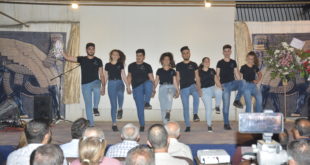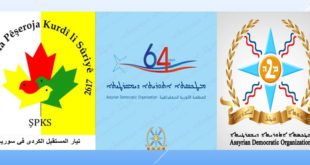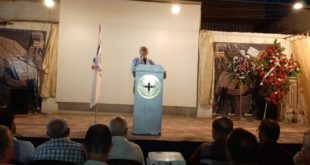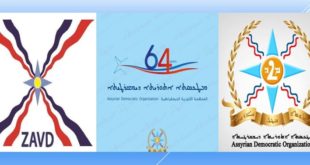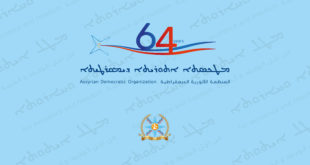Mr. Saeed Lahdo contribution to “Together in Confronting Hatred Among the Syrians”, an initiative launched by the National Democratic Conference in Syria NDCS. Hatred and ways to confront it.
Hatred and its various expressions in general are a special characteristic of a human being and excludes other creatures. It is not an intuitive state of being, but it is acquired, produced, revitalized, and embraced by certain conditions through which the individual or group is subjected to; which become in some cases an integral part of the morals of this individual or group. It is one of the most negative behaviour or expressions of life in societies, especially if it engulfs a larger group of people, who become to believe in collective attitude different in nature or in characteristics such as race, religion, sect, social class, and others.
On an individual level, hatred (speech) has a limited negative impact. Of course, it is easy to confront and overcome its negative effects, which are usually minimal. But if this discourse manifest itself in collective level and includes a wide spectrum of social fabric, it will have a destructive effect in the society in which the discourse emerges, especially if it is met with a similar or equal reaction from another group or groups in that society, it may lead to civil wars and to the disintegration and fragmentation of society, as it happened in the Syrian society when the revolution deviated from its basic national principles, after it was militarized and Islamised thru external support, funding and interventions. Thus, became hijacked and consequently dominated by extremism and chaos. Its noble objective shifted from demanding freedom and democracy to mere violence, destruction and population displacement on all sides without clear objectives and implementing agendas that are not made by Syria or the Syrians people; this shift or attitude tarnished the image of the revolution and gave way to the discourse of hatred and extremism, which is not characteristic to the nature and morals of the Syrian human being, that has been characterized throughout the ages by openness, urbanization, and civilized interaction with various elements and peoples that have passed through Syria over thousands of years, and the result of which was the building of an advanced civilization considered known as cradle of human civilization. The invention of the first alphabet in history was not accidental, but a result of richness and development of Syrian human being. Although the harsh conditions experienced by the Syrian society in recent decades have brought it back to an era of behavior of factional orientations that cannot in any way constitute a stage of the natural development of a society. Despite everything, the Syrian person remained mostly in line with logical expression of his cultural heritage, and expressed his individual behaviors that are gained over time through civilized features in the interaction and integration with the elements of diversity and pluralism in its natural environment.
However, going thru six continuous decades of the worst forms of, psychological, cultural, and deliberate social distortion have left, undoubtedly, its damaging effects that are manifested in the behaviours of many groups during the revolution, the regime and its associates on one hand, and those considered the opposition on the other; despite the inaccuracy of this description, which it includes all those who stood on the other side, in the forefront, terrorist groups and religious and sectarian extremism in all its forms and denominations, which made hatred its own ideology and applied it with iron fist to everyone who did not show blind obedience to it and to its black flags.
Here, we can distinguish four forms of hatred:
1- Socio-economic
This form of hatred has been found since ancient times in the behavior of some groups of human societies. It expresses itself at the social level in the form of (president / subordinate, leader / subordinate, master / slave, ruler / ruled, white / black, believer / infidel, sect / sect). With the subsequent development, another form of emerged, which may be called (city / countryside). And this matter was and still is closely related to the economic situation: (rich / poor).
These are also the components of the social classes that are produced by human development since the beginning of human settlement and the construction of agricultural villages or first settlements whose existence necessitated the requirements of leadership, organization, distribution of work tasks, and the sharing of wealth. Which it is not always characterized by justice and equality, which made the strongest enjoy the largest share of wealth while the work effort he provided is at the minimum leve, if he participates in any effort. And of course, this generates a state of hatred and friction that is reflected in various forms of negative behavior where violence will not be excluded, but possibly or likely adopted.
Perhaps the oldest example of this example is the slave revolt led by Spartacus against the Roman Empire in 73 BC. And of course, history tells us many of these revolutions and protests throughout the ages, as its main motive was this distinction based on hatred and contempt for the other, who is on the lower level and has no rights, based on class division; but forced into absolute obedience of his master.
2- Ethnic – Nationalist
In the middle of the nineteenth and early twentieth centuries, the concept of nationalism emerged as a discriminatory framework for human groups that share some special concepts such as geographical area, language, race, customs, traditions, common interests, and others. It is from these fundamentals’ principals that the concept of nationalism and nation inspired, and the national struggle among nations emerged. This specific conflict is derived and based on national self-interest. In order to win this conflict, which has taken the shape of a violent and destructive military campaign; feelings of hatred had to be fueled by rulers toward other heterodox nations and nationalities that are falsely seen or considered underdeveloped and inferior, while the group to which that ruler or the aggressor belongs to is proclaimed to the higher standard.
This was the beginnings of the end of the era of empires ruling, which encompassed many groups of peoples and nations. At this point humanity entered a new era, and the nation-state became its main characteristic, where one language, one race and one geographical area prevail for a group of people united by these elements.
3- Political-ideological
No sooner had the nation-state in Europe settled down, a new concept emerged in conjunction with the industrial revolution or rather as a consequence of it, which is the concept of political ideology initiated by Karl Marx and Friedrich Engels and their philosophy based on the class struggle in human society. This ideology, which is based on intra-international philosophy concepts that defied inter nation-state borders, it advocates for the working-class struggle against the capital class or capitalism. By doing so, it created a new type of discourse of class hatred, (capitalist / worker), under the slogan “Workers of the world unite”. Thus, humankind enteres into an ideological struggle that resulted in the victory of the Bolshevism revolution in Russia and then in China and some other countries. With new political development and destructive Stalinist iron fist applications of which the working class itself was its biggest victim and as a result paved the way into the collapse of the Communist regime based on this ideology; with the disintegration of the Soviet Union and the countries following it in Eastern Europe, thy returned to nation-state ideology.
4- Religious-sectarian
The Arab region in general, and Syria among them, was absent of those political development throughout the four hundred years of Ottoman colonial rule. Ottoman rule was seen by most of the population as a continuous of the old Islamic caliphate that could not be opposed. The ideas of the French Revolution in Enlightenment and Freedom did not reach this region until about a century after its inception. This came about by the enlightened graduates from European universities returning to their countries with new ideas, and the transmission of the First World War concepts of nation state and Western intervention to liberate the Arab countries from the Ottoman rule and the promises to establish the Arab state. Those promises ended with imposing Mandates followed by change in traditional values, as a consequence of the occupied areas. The most important of which is learning about the Western lifestyle, forms of government systems, and the way it deals with the citizens. This has had an impact on the pattern of local thinking, especially in Syria, where Syrians began establishing political parties under the French mandate. Among those parties was the Muslim Brotherhood MB, established in Aleppo in 1937 with the direct influence of the MB in Egypt and its founder, Hassan al-Banna. MB adhere to establishing of Islamic law and Islamic state, foremost among which is the caliphate. And who does not believe in Islam in this pseudo state, ought to, “people of the book or of THEMMAH”, pay tribute. The unbelievers or infidels are legally executed. This pattern of politico-religious thinking created a deep division among citizens of one country and divided them into groups according to their religious beliefs and not according to their national affiliation. This means a significant reduction in the rights of one group of citizens and the preference of another group and granting the later full rights over the others. This contradicts the principle of citizenship, freedom and human rights, thus creating a fertile environment for the spread of ill feelings and hatred among the groups. And create an atmosphere charged with intolerance and inequality under the roof of a country that is supposed to be for all its citizens.
This type of ideology transcended into other non-Sunni Muslim sects with same difference, according to this concept, it brings us back to the beginnings of the Middle Ages, when humanity had not yet realized the meaning of human rights and citizens, nor the concept of a modern state based on equality between citizens, but as subjects to whom the absolute ruler may behaves toward them as he pleases.
Naturally, hatred has escalated in light of such extremist religious calls. But what eased this discourse in Syria specifically before the establishment of the Syrian-Egyptian unity in 1958, is the awareness of the Syrian citizen compared to other Arab countries, and the establishment of other national parties of popular significance. Likewise, Arab nationalist parties transiting religion and borders under the slogan (One Arab Nation). The Syrians were in continuous confrontation with MB by promoting the inter-Arab national ideology, similarly the MB calls for (the pan Islamic Ummah) but at the expense of nationalism and secularism. These two letters were always opposing and quarrelsome. On the other hand, they were in agreement, with one another but differed in scope in their view, that is to say, sanctioned ideology of Arabism for nationalists, versus the Sunni pan Islamic for the MB.
With the arrival of Jamal Abdel Nasser to Syria, the idea of Arab nationalism reached its zenith, and escalated further with the arrival of the Baath Party to power in the 1963 coup, and with it the discrimination against all non-Arabs escalated. Other components suffered from persecution, denial of basic rights, and deprivation of many of the benefits that were available to the Arabs alone. The authorities embarked on the policies of systematic Arabization of all non-Arabs under the pretexts and nomenclature (national unity), which was in fact a kind of systematic destruction of that unit. The Syrian national identity began developing in the mid-1950s,
with all the progress and development that was achieved at every level by Syrian patriots during the Mandate rule and during nearly a decade of independent era, thru collective work towards a promising future; the nationalist could not out last under policies who came to destroy everything with the slogans of nationalism, freedom and socialism, vague and empty of any content. Then Hafez al-Assad and his successor came to destroy everything related to patriotism, freedom, life, and the dignity of the Syrians, and brought Syria brutally to its knee, as we see today.
In order, for Hafez Al-Assad to implement his plan that is to hold on power and maximize spoils to himself and his family as long as possible, he implemented the demoralizing of the army by introducing sectarian staffing over national officers, and legalized, bribery, corruption and favoritism on unprecedented scale ever known in Syria.
The regime surrounded itself with corrupted and opportunists by granting them positions and privileges, while free patriots were imprisoned and tortured in the cellars of the security services.
– Petrodollars and hatred:
On the other hand, the worst use of religion took place in the context of what was called the Islamic awakening, when oil prices rose madly after the 1973 war; Gulf States saved billions of surplus and initiated a spending program on spreading the Wahhabi version of Islamic extremism in the region and other countries of the world. Instead of using these surplus funds to support development projects in poor countries and building schools, universities and hospitals in the Arab world they were used to finance private projects and associations with charitable names for the sheikhs of Wahhabism and violent Islam, as well as building thousands of mosques around the world, in fact, it built the largest in the world in areas they often do not need, not to mention the formation of armed terrorist groups under the headlines of holy jihad, and providing the necessary funding for them without question, and unconditional support accompanied with speeches full of hatred aggression and prejudice for others, who do not belong or side with them in their ignorance, extremism, and arrogance.
– Revolution and revelation of mysteries:
The petrodollars had a preliminary effect and role in glorifying the culture of the desert and its ideas that are farthest from civilization, human principles and values, and calls for jihad, penance, conquest, spoils and forcing women into sex slaves, totally incompatible with all the charters, covenants and laws enacted by the United Nations concerning human values during the past decades. Here, we can imagine the extent of psychological and social traumas and the depth of the rift that can afflict a society like the Syrian society and what remains of its patriotism and its spirit of tolerance and fraternity; as a result of such hate policies and facing such predicament; the Assad regime was tolerant to those religious and extremist ideas, instead of pacifying them, as being a secular regime as it champion itself for promoting secular and free belief, on the contrary, the regime justified its action of brutal repression of the overwhelming popular revolution for freedom and dignity, under the pretexts and justifications of fighting terrorism and extremism, while releasing from its prisons the most dangerous terrorists to establish their extremist organizations and provide them with warehouses full of weapons and ammunition with coordinated agreement when orders were given to the army to withdraw from certain locations to be invaded by the terrorists with tacit agreement of the regime, to seize weapons cache left by the army for the terrorist to use in combating the revolution and suppressing the rebels.
With the availability of internet services and the spread of social media and its far reaching almost every home and person, extremists and fatwas (religious decrees) began to broadcast their poisonous sermons as they bragged in front of the cameras as proxies to God, inciting young people to join and fight for jihad and gain spoils from the infidels. They rushed to blow up themselves indiscriminately among the civilians because the Sheikh has promised them sex slaves waiting for them in heaven.
The catastrophe of Islamic religious extremism reached its climax soon after the militarization of the Syrian revolution, the release of hundreds of experienced terrorist leaders from the prisons of Assad in Syria and Nuri al-Maliki of Iraq, puppet of Iran. This enabled the terrorist to form their own private armies of jihadists with expectation to go to paradise by shedding the blood of infidels and opponents, and to fight against the revolution of freedom and dignity in order to destroy it. It is remarkable they were recipients of unlimited financial support from organizations from the gulf states, as well as the governments of the Gulf States, especially Qatar. they also received logistical support from the Erdogan government in Turkey, which has opened its border routes to ship arms and volunteers to jihadi controlled areas, on a large scale. Which raised the level of hatred in the war to the extreme violent and tragic. Where the Syrian still suffers from it, publicly or implicitly, in almost all Syrian regions. It is no longer a shame that one speaks out in the open, in front of everyone of the atrocities committed against the population.
– Ways to confront hatred:
There is no doubt that this type of hatred is the most dangerous thing any society will ever face. Therefore, civilized societies have enacted laws to criminalize and punish such perpetrators. As for the Syrian case, this comes from the very authority that it is supposed to confront and eradicate its influence and its destructive effects on the society and the individuals. Rather, it indorsed it with the enactment of governmental laws and procedures according to which it gives the rights and privileges to some groups, sects and people, while depriving others of them.
This is from the side of the regime and its institutions. As for the other side, where extremist organizations are concerned, the matter does not need any laws or organizational procedures, but rather the will of the armed individual or the leader of the group or whoever represents the leader, to exercise his influence where he can, at any time and in any place. Therefore, in this case, those who are different in religious belief, sect, nationalism, or even opinion cannot survive and the only way for them to continue living is leave the country and immigrate, if they have this possibility, or face their fate.
Confronting this type of rhetoric will not be easy under these circumstances, if not impossible. The regime, which lacks any form or sense of national responsibility, strives with all its power to maintain its status that he has worked tirelessly, tens of years, to strengthen and consolidate it the way it is now. The regime is still resisting any change, no matter how simple, as long as Russian and Iranian supporters continue their support; while the international community has not exerted any real pressure to reach a peaceful solution to move to a free democratic system, and implement practical solutions and to enact the necessary laws for all the problems that Syrian society suffers from today, foremost of which is the problem of hatred.
On the other side, we find that the problem is the same, when we see the supporters of these groups, being the regime itself; who practice the same discourse towards opposing party. How is it possible to compel those who are recruited by the regime to carry specific actions to do other than what they were created for !!!
Hope remains, to its rarity, in us ordinary Syrians who are deprived of any authority or power, and with weak capabilities, that we will do something that will have an effective impact on the occupied Syrian land by forces that have no interest in confronting such a discourse. It would be unrealistic to assume it would destroy the foundations on which the inflammatory rhetoric of the regime was built on. However, this does not absolve us of the responsibility to try to sow the seed of love and tolerance and acceptance of the other who is different in the true patriotism, and continue nurturing with firm will and persistence to possess a possible space on the homeland and in the minds and consciences of the Syrians, to provide a suitable climate for the growth of this seed, and spread it in time to include All Syrians, as they were before the storms of hatred and ignorance blew upon us.
In this regard, we must take advantage of others’ experiences to reduce societal tension between the conflicting groups on the bases of a perception, pre-assessment or other causes of hate. Here we have a good example of South Africa’s Nelson Mandela noting the great difference between the two cases. Despite this difference, this experience leads us to invent our own solutions when the time comes for the Syrian citizen to decide. With hope in coming days we would have a national leader like Mandela.
Until then, we must search for the ways with determination and seriousness, and one of the most important point, from my view, according to the circumstances we are currently going through:
• An inclusive meeting of all national groups, parties, and personalities to formulate an inclusive national discourse characterized by objectivity and tolerance, rejecting any form of hatred of other, and establishing a gathering similar to the Syrians National League that includes everyone who sees himself in harmony with this national human trend, with complete neutrality towards any political situation outside this framework.
• Create a special site on the web for this gathering, open to all, to publish everything related to this trend.
• Carry out activities to raise awareness and enlightenment in this field and show the extent of the damage that the hatred inflicts on homeland Syria and the Syrians as citizens.
• Acting earnestly in the name of this gathering to communicate with the actors and interested countries and individuals to explain the mission of this gathering and request assistance to express these aspirations and principles on the ground.
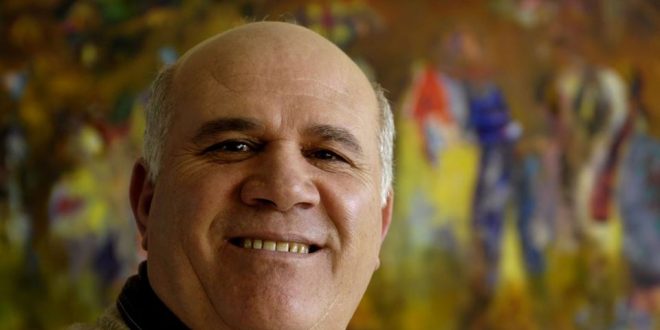

 المنظمة الأثورية الديمقراطية ADO-world
المنظمة الأثورية الديمقراطية ADO-world
